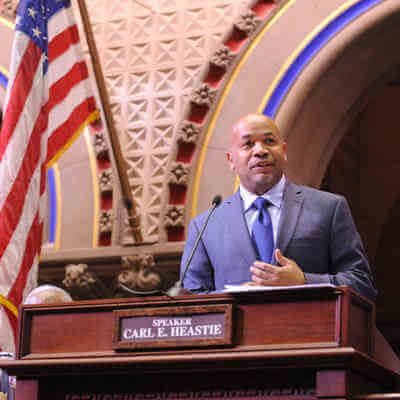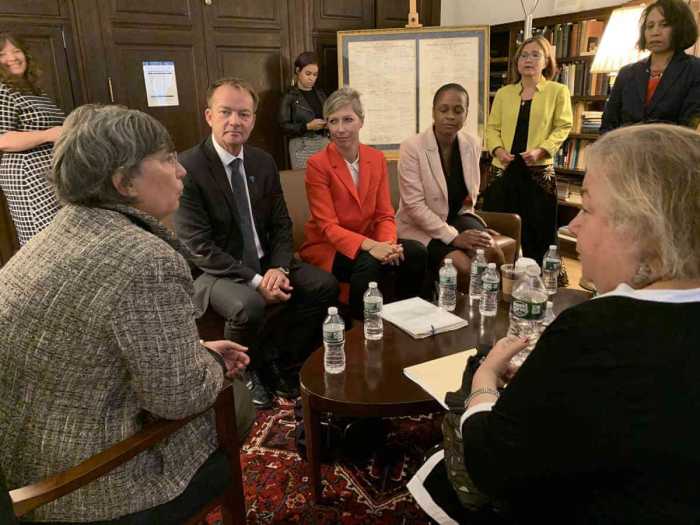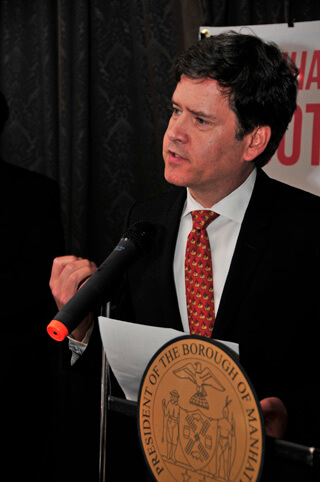Efforts to pass gestational surrogacy in the State Legislature have withered in the lower chamber and Assembly Speaker Carl Heastie confirmed on June 20 that the bill is dead for now, citing concerns about women’s rights and fears of commercialization.
Heastie, however, indicated that lawmakers and advocates would continue crafting the legislation in the coming months in such a way that would attempt to quell lingering reservations about the issue.
The movement to pass gestational surrogacy, which involves a surrogate carrying a baby who has no biological relation to her, became a key issue in the LGBTQ community’s efforts in Albany during the final months of the session because the current ban on compensated surrogacy in New York disproportionately affects same-sex couples. The measure passed the State Senate, but ran into roadblocks in the lower house, even as Governor Andrew Cuomo aggressively campaigned for the issue and enlisted the help of Bravo TV show host Andy Cohen, who had a baby son through surrogacy.
In the lower chamber, though, out lesbian Democratic Assemblymember Deborah Glick of Manhattan infuriated some in the LGBTQ community and drew cries of betrayal when she expressed hesitation on the measure after previously vowing support for it. She told The New York Times earlier this month that gestation surrogacy is “pregnancy for a fee, and I find that commodification of women troubling.” She also suggested that gestational surrogacy isn’t necessarily an issue for the wider LGBTQ community because many folks are unable to afford the tens of thousands of dollars to have kids that way.
But Democratic Assemblymember Amy Paulin of Westchester County, who led the bill in the lower house, told Gay City News with roughly one week left to go in the session that she was working to garner support for the bill. That effort never came to fruition.
“While there are strong feelings about surrogacy on all sides, I want to make it clear that no single member is in a position to stop this or any bill,” Heastie said on June 20 in a clear effort to spare Glick from being singled out. “Many members, including a large majority of women in our conference, have raised important concerns that must be properly addressed before we can move forward.”
He continued, “We must ensure that the health and welfare of women who enter into these arrangements are protected, and that reproductive surrogacy does not become commercialized. This requires careful thought. While our work for this session is nearly complete, I look forward to continuing this conversation in the coming months with our members and interested parties to develop a solution that works for everyone.”
Out gay Democratic State Senator Brad Hoylman of Manhattan, who has two young daughters through gestational surrogacy and carried the bill in the upper house, expressed disappointment that the bill couldn’t pass this session.
“My children are the most important thing in the world to me,” Hoylman said. “Everyone in New York, including LGBTQ New Yorkers and people struggling with infertility, should have the same opportunity to build a family as my husband and me and the residents of the 47 other states that allow compensated surrogacy agreements. I’m glad we were able to move our surrogacy legislation to the Senate floor with the help of Leader Andrea Stewart-Cousins, where it passed with widespread support of my colleagues. While it’s a shame that we weren’t’ able to get a vote on the bill in the State Assembly during this 50th anniversary year of Stonewall, I look forward to working with my colleagues to pass this legislation next year.”



































